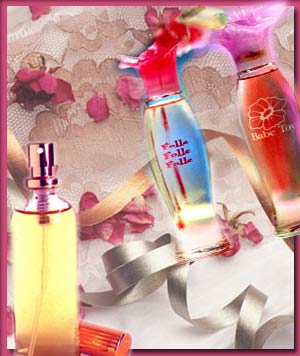French Perfume

Perfumes can tease your senses, stimulate your imagination or fill you with a feeling of adventure, freedom and serenity. How many times have you had a whiff of smell that has taken you down memory lane - smells that remind you of people and places? Some fragrances remind us of a special person - a partner, favorite teacher or a loving grandma. Perfumes form an essential part of most women's make up and dressing and are associated with luxury and sensuality. French perfumes have traditionally been at the forefront of the fragrance industry and account for a large chunk of the designer perfume market too.
History of Perfumes
Since ancient times, products that enhanced the smell of the body have been used. The ancient Egyptians used many scented creams and emollients during their ritual baths. Aromatic gums from China were in great demand in Europe. Burning of incense was a religious ritual followed in many cultures. Egyptians anointed their dead with scents of honey and cinnamon. Persia, India and Arabia also used herbs and flowers as an integral part of their culture.
Perfumed oils served as cosmetics and were also used for their medicinal properties. Soon perfumery became an industry with various olfactory categories such as floral, woody, aromatic and oriental. Perfumes differ from eau de toilettes and colognes in the amount of concentration of oils in them. Perfumes have the highest levels of concentration. Since the oils are the most expensive ingredients, higher levels of concentration mean more expensive products.
These days synthetic ingredients are being widely used to create an array of fragrances heady and mesmerizing. A sizeable chunk of perfumes are created with synthetic chemicals and natural oils are added in miniscule proportions to add to the richness of the product. Perfumes are made of perfume oil, alcohol and water. Perfumes are created with care by 'noses', who are skilled in the art of blending different essences.
French Perfume Industry
The French town of Grasse has been historically known for its perfume industry. Located close to the French Riviera, the town saw the birth of the French perfume industry in the 16th century. Perfumers and apothecaries were established aplenty. The flower fields of Grasse provided the perfumers with jasmines, roses and orange trees. French perfumes still remain the choice of most connoisseurs.
L'Oreal is one of the premier French perfume companies along with brand names such as Lancôme, Ralph Lauren, Cacharel, Guy Laroche, Giorgio Armani, Paloma Picasso and Lanvin. The Louis-Vuitton-Moët-Hennessy group owns French perfume brands such as Christian Dior, Guerlain, Givenchy and Kenzo. Another major group in the French perfume industry is Elf Aquitaine Group with brands such as Yves Saint-Laurent, Nina Ricci, Van Cleef and Arpels, Oscar de la Renta.
Women's Perfume
Each one of us has some perfumes that suit us better than others. Individual pH levels determine the reaction of the ingredients contained in the fragrance. Those of us with oily skin will retain the fragrance for a longer time on account of the greater natural moisture. Our unique body chemistry causes each perfume to react differently on different people. Women's perfumes must not be selected merely on the brand name and fancy bottles.
Perfumes when applied to the pressure points can go a long way in keeping you enveloped in a cloud of fragrance. Applying perfume to the insides of your wrists, insides of your elbows and back of your knees and the neck and collarbone is also effective. Layering your perfume may help in retaining the fragrance for a longer time. A little perfume on your feet can also be a good idea. The art of applying perfume lies in creating a tantalizing feeling without saturating the olfactory senses.
Ideally perfume must be applied an hour before going out since it leaves enough time for the fragrance to blend with the skin's natural oils. Do not apply perfume on costume jewelry since it can strip off the coating. Choose perfumes that complement your natural body odor. Wear stronger perfumes in winter, as the cold weather tends to reduce the strength of a fragrance. You can change your perfume for different seasons.
Designer Perfume
Designer perfumes make for excellent gifts. There are fragrances that cater to different tastes - spicy, fruity, woody, musky and aquatic. They need to be stored away from bright sunlight in a cool and dark place with the cap tightly secured. There is an alluring range of designer perfumes from Calvin Klein, Hugo Boss, Thierry Mulger, Ralph Lauren and Dolce and Gabbana.
Some exclusive fragrances can be got from Van Cleef and Arpels and Rochas. Choose a perfume that is appropriate to the age of the person. Some people prefer subtler and lingering fragrances while others would rather opt for an eau de toilette or mist. Designer perfumes come in attractive bottles with ornate details. You can pick up flower shaped or even cupid shaped bottles.
Chanel No. 5 was one of the premier perfume brands that led the designer market. It continues to remain an all-time favorite women's perfume. Obsession, Poison, True Love, Encounter, Opium, Tresor, Eternity and Intuition are other popular designer perfume brands. Try out the range from Paco Rabanne, Boucheron and Carolina Herrera for exclusive women's perfumes.
Top of the Page: French Perfume
Tags:#french perfume #womens perfume #designer perfume
 Beauty
Beauty Natural Deodorant
Fragrance Guide
Aromatherapy
Aromatherapy Massage
Home Fragrance Diffuser
Incense Burner
French Perfume
Perfume Oil
Avocado oil
Top of the Page: French Perfume
Popularity Index: 101,130

